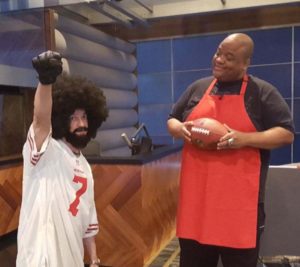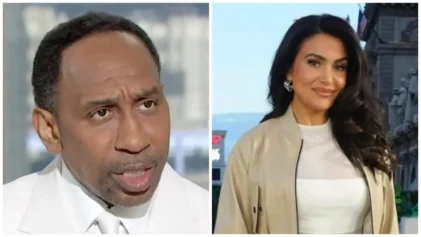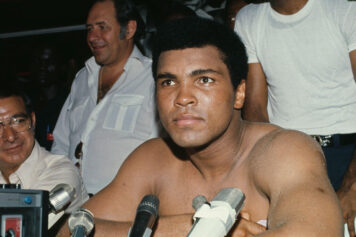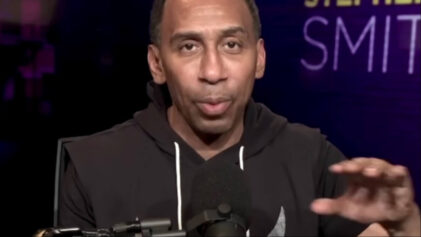
Fox Sports 1 host Jason Whitlock gave space on his set to Christopher Reid of Kid ‘N’ Play fame to mock former NFL quarterback Colin Kaepernick. Source: Twitter
Among the most prominent Black personalities in media today are Stephen A. Smith of ESPN, and Jason Whitlock of Fox Sports 1. Both television sports commentators represent moderate to conservative voices with a pro-status quo outlook, particularly regarding their attitudes towards Black athletes.
The NFL is 70 percent Black, just as the NBA is 76 percent Black. Yet, particularly in the NFL, large majorities of team staffing are white, all the owners are white, and most of the coverage of the sport is done by white men. That makes it particularly interesting when Black commentators begin to echo the sentiments of the conservative white-male dominated sports culture and fan base of the NFL, which is the “unofficial sport of red state America” and provides a safe space for conservative values and patriotism, but discourages political commentary.
Some high-profile Black commentators believe these players should keep quiet, throw the ball, and just be thankful they have a contract and are getting paid. They reserve much of their criticism for Black athletes who care about Black issues and take a political stand. In the absence of a variety of viewpoints in the media, such conservative Black voices serve a valuable purpose, which is to reassure the white sports fan base and white America in general, that athletes who challenge society are the nail that sticks out and must be hammered down.
The outspoken Stephen A. Smith, perhaps the most well-known face on ESPN, has been a lightning rod for controversy. Some would argue, including Smith, that the attention is focused on him because he is Black. Others would call him the type of “angry” Black man that says things that are not threatening to the white public. “Like when they say to me, ‘Screamin’ A.’ — I’m the only dude on the air who’s loud?” Smith said. “I know plenty of white dudes who are screaming and going off. They’re called passionate. I’m called loud.”
Smith has faced criticism for calling out some athletes worthy of support, and giving a pass to others deserving condemnation. During the Ray Rice domestic violence incident in 2014, Smith was suspended from ESPN for a week after suggesting battered women provoke their abusers, and telling women to “make sure that you can do your part to do whatever you can do to make, to try to make sure it doesn’t happen.”
Smith called Kaepernick’s protest a “distraction,” and said he could not knock the NFL teams for refusing to sign Kaepernick. He accused the player of hypocrisy and questioned his authenticity for not voting. The ESPN personality also criticized Seattle Seahawks defensive lineman Michael Bennett for supporting Kaepernick and failing to take into account Colin’s nonvoting record. Bennett’s praise should have been reserved for civil rights leaders of the past who registered people to vote in the South, Smith insisted.
Nevertheless, Smith also recently commented in ESPN’s “The Undefeated” that given the events in Charlottesville, there is no doubt the racism Kaepernick is protesting is real, if not worse than previously thought. He ripped the Cleveland police and EMT unions for refusing to hold the flag at the Browns’ football games because the team’s players took a knee during the national anthem, and said he was not surprised that Michael Bennett, as a Black man, was allegedly the victim of excessive force by Las Vegas police and had guns pointed at him.
While Smith has aimed for shock value and and elicited controversy in his remarks about Black athletes, Jason Whitlock of Fox Sports 1 has gone the extra mile. The former editor-in-chief of The Undefeated, Whitlock has demonstrated a meanness and antipathy toward particular Black players, and has ridiculed Black social justice movements and the Black community in general. For example, when shock jock Don Imus called members of the Rutgers basketball team “nappy-headed hos,” Whitlock blamed Black people for Imus’ statement.
Thank you, Don Imus. You extended Black History Month to April, and we can once again wallow in victimhood, protest like it’s 1965 and delude ourselves into believing that fixing your hatred is more necessary than eradicating our self-hatred.
While we’re fixated on a bad joke cracked by an irrelevant, bad shock jock, I’m sure at least one of the marvelous young women on the Rutgers basketball team is somewhere snapping her fingers to the beat of 50 Cent’s or Snoop Dogg’s latest ode glorifying nappy-headed pimps and hos.
I ain’t saying Jesse, Al and Vivian are gold-diggas, but they don’t have the heart to mount a legitimate campaign against the real black-folk killas.
It is us. At this time, we are our own worst enemies.
Whitlock once called Serena Williams “immature and classless” for celebrating a victory with a “Crip walk,” and suggested she is a fat underachiever: “With a reduction in glut, a little less butt and a smidgen more guts, Serena Williams would easily be as big as Michael Jackson, dwarf Tiger Woods and take a run at Rosa Parks,” he said.
The sportscaster reserves much of his ammunition for Black Lives Matter, which he called “a lie,” and Colin Kaepernick. In response to the NFL national anthem protests against police violence, Whitlock jokingly proposed a new sports channel called Anthem Zone:
If you support Colin Kaepernick, you’ll love the NFL’s newest channel… Anthem Zone! pic.twitter.com/dylo74jyIq
— Speak For Yourself (@SFY) August 15, 2017
Whitlock — who blamed Black Lives Matter for Trump’s victory and for making “white people more confident in their bigotry” — accused Kaepernick of “playing the police brutality card” to gain Black credibility and help his career. He also suggested Kaepernick was part of a an anti-NFL liberal conspiracy to make the league appear racist.
“Black people are too successful in football, and these liberals want to put a stop to that,” Whitlock said on his FOX Sports 1 show on September 6. But the previous day Whitlock apparently outdid himself when he brought in Christopher Reid, the “Kid” from Kid N’ Play, to do an impersonation of the now-unemployed NFL player in an Afro wig and black glove.
Great to have Kap stop by the studio today. pic.twitter.com/2UPuyCdWdK
— Jason Whitlock (@WhitlockJason) September 6, 2017
Shannon Sharpe, former NFL player and co-host of Fox Sports 1’s Undisputed, reacted strongly to Whitlock’s skit:
I’m going to address it with head of Fox sports/FS1 . This is UNACCEPTABLE https://t.co/YNzHmSoD5l
— shannon sharpe (@ShannonSharpe) September 6, 2017
The skit proved to be too inflammatory for the network, which decided not to air it in the wake of the immediate blowback Whitlock’s tweeted picture received.
One solution to the prevalence of moderate and even conservative-to-reactionary Black commentators on racial justice matters is to have more figures such as Sharpe as a countervailing force. With too few Black voices in the media to begin with, the true breadth and scope of the ideas in the Black community are not reflected.
While sports, in theory, should be a great equalizer with everything coming down to who scored the most points, no corner of society is immune from racism. Black athletes are expected by whites to serve as entertainers and gladiators for the crowd and represent their race and community. Sports are also wrapped up in notion of American patriotism, where Black athletes have been punished for bringing politics into the game.
Sports can be lucrative, and many Black players, fearing a loss of their livelihood, have been chastised for taking the money and failing to take a political stand. The protests that Colin Kaepernick initiated have started to turn the tide of Black athlete activism. However, a number of Black commentators and athletes also draw the wrong lessons from heroes such as Muhammad Ali. They admire his showboating and trash-talking, but neglect to learn from his conscientious objection to the Vietnam War — which nearly cost him his career and his freedom — and his stinging rebuke of racism and injustice.
Kaepernick was not the first athlete to display pro-Black political protest, nor was he the first to pay a price. The 200 meters medalists at the 1968 Summer Olympics in Mexico City — John Carlos and Tommie Smith, with assistance from Australian Peter Norman — were cast out of sports and their careers ruined when they participated in the now iconic Black power fist salute.
These days, a new generation of athletes attempts to take a stand in its own way, but it may face pushback from owners and leagues who write the checks, but also well-paid commentators who have great sway over public opinion. If members of the white public, and policymakers, turn to these commentators to validate commonly held racial stereotypes —in the absence of more positive narratives — the progress of the Black community could suffer.
There are implications for Black athletes and sports commentators and how they should conduct themselves. As they do their job, they must determine what is necessary to further their own careers, the effect of their actions on their community, and whether they should use their fame and prominence to improve the condition of their community. Their impact on the public is clear, but the choice is theirs.


